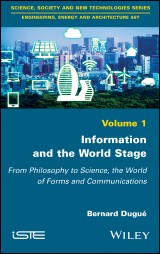Details
Information and the World Stage
From Philosophy to Science, the World of Forms and Communications1. Aufl.
|
139,99 € |
|
| Verlag: | Wiley |
| Format: | EPUB |
| Veröffentl.: | 10.08.2017 |
| ISBN/EAN: | 9781119452881 |
| Sprache: | englisch |
| Anzahl Seiten: | 192 |
DRM-geschütztes eBook, Sie benötigen z.B. Adobe Digital Editions und eine Adobe ID zum Lesen.
Beschreibungen
<p>Modern science is at a tipping point. A new page in the history of knowledge opens with the “information paradigm”, a notion which is gradually supplanting the old mechanistic vision inherited from Galileo and Newton.</p> <p>The author presents an overview of the place of information and communications in our time, explaining some reasons for focusing on these two notions. All areas of knowledge are concerned: philosophy, social sciences, biology, medicine, as well as physics, the so-called “queen of sciences”, from quantum to cosmos. </p> <p>This book is intended for scientific scholars as well as those with just a general interest who are anxious to understand the major evolutions that are taking shape in fields of knowledge in the 21st Century.</p> <p> </p>
<p>Foreword ix</p> <p>Introduction xiii</p> <p><b>Chapter 1 A Presentation of the Paradigm of Information in the 21st Century 1</b></p> <p>1.1 After technology, the philosophy of information 1</p> <p>1.1.1 Information, issues and paradigms of the 21st Century 1</p> <p>1.1.2 Philosophizing means being concerned 3</p> <p>1.1.3 Technology affects us 4</p> <p>1.1.4 Information affects us 6</p> <p>1.1.5 Where can we situate a philosophy of information? 8</p> <p>1.1.6 The two philosophies, technology and information 10</p> <p>1.1.7 What is information? 11</p> <p>1.1.8 Universal thinking 14</p> <p>1.2 CRISPR-Cas9: from mechanism to information in biology 15</p> <p>1.2.1 Brief review of a significant scientific discovery 15</p> <p>1.2.2 From Monod’s biology to information biology 17</p> <p>1.3 Toward a theory of the information act 22</p> <p>1.3.1 Image act, the power of images 22</p> <p>1.3.2 Thoughts about Horst Bredekamp’s study, the theory of the image act 23</p> <p>1.3.3 Language and image resonances 28</p> <p><b>Chapter 2 Communication Influences the “Mechanisms” of the Living World and Society 31</b></p> <p>2.1 Philosophical approach to cancer through information and immunity 31</p> <p>2.1.1 A note on a potential dead end in the research on cancer 31</p> <p>2.1.2 An alternative hypothesis: Darwinian carcinogenesis 33</p> <p>2.1.3 Leaving the current paradigm behind 34</p> <p>2.2 Fanaticism and fantasies, a “pathology” of information and its interpretation 36</p> <p>2.3 Scientific communication and modernism in contemporary societies 39</p> <p>2.3.1 Distinguishing between technological and mediated activity through social norms and subjects 40</p> <p>2.3.2 Destructuring the subject and semantic mediations 41</p> <p>2.3.3 Scientific contamination of ideology and depoliticization of society 42</p> <p><b>Chapter 3 Form, Information and Content 45</b></p> <p>3.1 Form and content, an old story that still affects our existences 45</p> <p>3.2 Ontology of form and content 48</p> <p>3.3 Brief remarks about a type of philosophical and scientific research 51</p> <p>3.3.1 Structure and order of Content: logic and/or structure of form 51</p> <p>3.4 Ontology of form and Content, ending the issue of machines before machines end us 53</p> <p>3.5 The ontological difference and the path toward Being 55</p> <p>3.6 The three colors of Being and modernist perdition 59</p> <p>3.7 Brief notes on the oblivion of Content as ontological difference revealed by decline 63</p> <p><b>Chapter 4 Mass, Charge, Gravity and Rays: Distinguishing Between the Two Kinds of Universal Physics 69</b></p> <p>4.1 Masses, arrangement and mechanics 69</p> <p>4.2 Electric charge, spin and dynamics of information 71</p> <p>4.3 Light-like and time-like geodesics in relativistic cosmology 74</p> <p>4.4 Overview of the dynamics of arrangement and information 77</p> <p>4.5 Einstein and the question of the field in physics 80</p> <p>4.6 The cosmological alternative in the 21st Century 82</p> <p>4.6.1 Provisional conclusion: what kind of physics for the 21st Century? 83</p> <p><b>Chapter 5 From Objects to Fields, Reinterpreted Contemporary Physics and the Path Toward Quantum Gravity 85</b></p> <p>5.1 Fields, arrangements, communications 85</p> <p>5.1.1 Cosmology of communications 87</p> <p>5.1.2 Cosmology of arrangements 88</p> <p>5.2 Einstein’s treatment of the hole argument 90</p> <p>5.3 Quantum gravity, the greatest scientific challenge of the 21st Century 92</p> <p>5.3.1 From gravitation to entanglement 92</p> <p>5.3.2 Quantum gravity elaborated as physics of information 96</p> <p>5.3.3 A digression about the Microscope mission and the notion of gravity-quantum geodesic 101</p> <p>5.3.4 Quantum gravity, a way of conceiving matter, and the Logos of the universe 105</p> <p>5.4 Do gauges reveal the secrets of the universe? 107</p> <p>5.5 The universe as stage and theater of animated objects 112</p> <p>5.5.1 Overview, the actors and the stage 113</p> <p>5.6 Rethinking matter: a summary first glance 116</p> <p>5.7 A second summary view of a universal type of physics: mass, charge, spin, photon 118</p> <p><b>Chapter 6 Physics in the 21st Century in Relation to Information and Arrangements 121</b></p> <p>6.1 Action and information, digressions about philosophy and contemporary physics 121</p> <p>6.2 Seeing, perceiving, receiving: Leibniz and Newton 125</p> <p>6.3 Postmodern philosophy of nature and the meaning of existence 129</p> <p>6.4 A universal outline, from quanta to the cosmos, information and arrangement 131</p> <p>6.4.1 The origin of the two kinds of physics 131</p> <p>6.4.2 The two cornerstones of physics in relation to communication and arrangement 131</p> <p>6.5 Time and stage: from quanta to the universe 135</p> <p>6.5.1 Aristotle, Newton and Einstein 135</p> <p>6.5.2 Relativity, of course, but so many mysteries! 137</p> <p>6.5.3 Time and stage 139</p> <p>6.6 Information, memory and order 142</p> <p>6.6.1 Dialectical relationships between information and arrangement in the universe and the living world 142</p> <p>6.6.2 Two kinds of memory, action and perception 142</p> <p>6.6.3 Arrangement, perception and information in nature 143</p> <p>6.7 Some connections between science and the metaphysics of philosophers 144</p> <p>6.8 A new paradigm, information in communication, arrangement and transformation 147</p> <p>6.8.1 To enter the age of information 148</p> <p>6.9 Overview: from quanta to the gravity-quantum apparatus and the universal stage 150</p> <p>Conclusion 155</p> <p>Postface 159</p> <p>Bibliography 161</p> <p>Index 163</p>
<strong>Bernard Dugué</strong>, École Nationale Supérieure des Mines de Saint-Etienne, France.


















